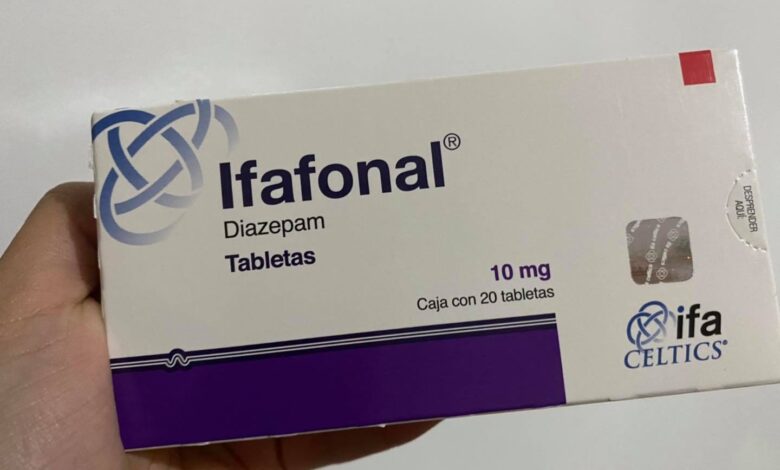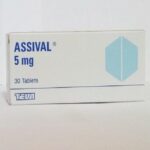Ifafonal: Uses, Dosage, Side Effects, Addiction

Ifafonal is a brand of diazepam produced in Mexico by IFA Celtics ,a company founded in 1940. Ifafonal is used to treat episodes of increased seizures (such as cluster or breakthrough seizures) in people who are already taking medications to control their seizures. Diazepam works by calming the brain and nerves. It belongs to a class of drugs known as benzodiazepines.
Ifafonal is only recommended for short-term treatment of seizure attacks. It is not for ongoing daily use to prevent seizures. Uncontrolled seizures can turn into serious (possibly fatal) seizures that do not stop. Diazepam is not recommended for children younger than 6 months of age because of the risk of serious side effects.
How should I use Ifafonal?
The recommended dose of diazepam for adults ranges from 2 mg to 10 mg, taken 2 to 4 times daily. For children older than 6 months, the initial dose usually ranges from 1 mg to 2.5 mg, taken 3 or 4 times daily.
It is important that the dose be individualized to your specific needs to avoid excessive sleepiness or motor impairment.
Ifafonal is normally used for a short period of time or as required. It may be habit-forming when taken for long periods of time. If you have been using this medication regularly for a long period of time (i.e., more than 1 month), do not stop using the medication without speaking with your doctor. To avoid withdrawal effects, a gradual reduction in dose is usually recommended when stopping this medication.
Many things can affect the dose of medication that a person needs, such as body weight, other medical conditions, and other medications. If your doctor has recommended a dose different from the ones listed here, do not change the way that you are using the medication without consulting your doctor.
It is important to use this medication exactly as prescribed by your doctor. If you miss a dose, administer it as soon as you remember and continue with your regular schedule. If your next dose is in less than 6 hours, skip the missed dose and continue with your regular dosing schedule. Do not administer a double dose to make up for a missed one. If you are not sure what to do after missing a dose, contact your doctor or pharmacist for advice.
Store at room temperature in a dry place. Keep out of reach of children.
Do not dispose of medications in wastewater (e.g. down the sink or in the toilet) or in household garbage. Ask your pharmacist how to dispose of medications that are no longer needed or have expired.
Who should NOT take Ifafonal?
Do not take Ifafonal if you:
• are allergic to diazepam or any ingredients of the medication
• are allergic to any other benzodiazepines
• have acute narrow-angle glaucoma
• have decreased liver function
• have myasthenia gravis
• have severe breathing problems
• have sleep apnea
Do not give this medication to infants under 6 months of age.
What are the side effects of Ifafonal?
The following side effects have been reported by at least 1% of people taking Ifafonal tablets. Many of these side effects can be managed, and some may go away on their own over time.
Contact your doctor if you experience these side effects and they are severe or bothersome. Your pharmacist may be able to advise you on managing side effects.
• blurred vision
• clumsiness or unsteadiness
• constipation
• dizziness or lightheadedness
• drowsiness
• headache
• muscle weakness
• nausea
• slurred speech
Although most of these side effects listed below don’t happen very often, they could lead to serious problems if you do not check with your doctor or seek medical attention.
Check with your doctor as soon as possible if any of the following side effects occur:
• anxiety or agitation
• confusion
• falls and fractures
• hallucinations (e.g., seeing or hearing things that aren’t there)
• incontinence (difficulty holding urine)
• low blood pressure (dizziness or fainting when rising from a sitting or lying position)
• memory loss
• mood or behaviour changes (e.g., aggression, rage, anxiety, or excitation)
• nightmares
• signs of depression (e.g., poor concentration, changes in weight, changes in sleep, decreased interest in activities, thoughts of suicide)
Stop taking the medication and seek immediate medical attention if any of the following occur:
• signs of a serious allergic reaction (e.g., abdominal cramps, difficulty breathing, nausea and vomiting, or swelling of the face and throat)
Some people may experience side effects other than those listed. Check with your doctor if you notice any symptom that worries you while you are taking this medication.
Are there any other precautions or warnings for this medication?
Before you begin using a medication, be sure to inform your doctor of any medical conditions or allergies you may have, any medications you are taking, whether you are pregnant or breast-feeding, and any other significant facts about your health. These factors may affect how you should use this medication.
Alcohol and other medications that cause drowsiness: Alcohol and other medications that cause drowsiness, such as antidepressants, sleeping pills, anxiety medications, or narcotic pain relievers, should be avoided when you are taking diazepam. Combining any of these medications with diazepam can result in severe drowsiness, breathing problems, and possibly coma and death. People who have an addiction to alcohol or other medications should not take diazepam, except in rare situations under medical supervision.
Dependence and withdrawal: Physical dependence (a need to take regular doses to prevent physical symptoms) has been associated with benzodiazepines such as diazepam. Severe withdrawal symptoms may occur if the dose is significantly reduced or suddenly discontinued. These symptoms include seizures, irritability, nervousness, sleep problems, agitation, tremors, diarrhea, abdominal cramps, vomiting, memory impairment, headache, muscle pain, extreme anxiety, tension, restlessness, and confusion. Reducing the dose gradually under medical supervision can help prevent or decrease these withdrawal symptoms.
Rebound anxiety may also occur if treatment with diazepam is stopped abruptly. Rebound anxiety is a temporary syndrome where the symptoms that led to use of diazepam come back stronger than before.
Depression: Benzodiazepine medications such as Ifafonal have been known to cause mood swings and symptoms of depression. If you have depression or a history of depression, discuss with your doctor how this medication may affect your medical condition, how your medical condition may affect the dosing and effectiveness of this medication, and whether any special monitoring is needed. If you experience symptoms of depression such as poor concentration, changes in weight, changes in sleep, decreased interest in activities, or notice them in a family member who is taking this medication, contact your doctor as soon as possible.
Drowsiness/reduced alertness: Because Ifafonal causes drowsiness and sedation, do not engage in activities requiring mental alertness, judgment, and physical coordination (such as driving or operating machinery) while taking it. This is particularly true when you first start taking the medication and until you find out how the Ifafonal affects you. Alcohol can increase the drowsiness effects and should be avoided.
Liver function: Liver disease or reduced liver function may cause this medication to build up in the body, causing side effects. If you have liver problems, discuss with your doctor how this medication may affect your medical condition, how your medical condition may affect the dosing and effectiveness of this medication, and whether any special monitoring is needed.
Suicidal or agitated behaviour: People taking this medication sometimes feel agitated (restless, anxious, aggressive, emotional, and feeling not like themselves), or they may want to hurt themselves or others. This behaviour is more likely to occur in children or seniors, however it can occur in other adults, particularly those with mental or emotional disorders. These symptoms may occur within several weeks after starting this medication. If you experience these side effects or notice them in a family member who is taking this medication, contact your doctor immediately. You should be closely monitored by your doctor for emotional and behaviour changes while taking this medication.
Pregnancy: This medication should not be used during pregnancy unless the benefits outweigh the risks. If you become pregnant while taking this medication, contact your doctor immediately. Babies born to mothers who have used Ifafonal regularly during late pregnancy may have breathing difficulties and show signs of withdrawal when they are first born.
Breast-feeding: This medication passes into breast milk. If you are a breast-feeding mother and are taking Ifafonal, it may affect your baby. Talk to your doctor about whether you should continue breast-feeding.
Children: The safety and effectiveness of this medication have not been determined for use by children less than 6 months old.
Seniors: Seniors may be at increased risk for the sedative and impaired coordination effects of this medication. Seniors should be started on lower doses of this medication. They also need to use extra caution, for example, when getting up during the night.
What other drugs could interact with this medication?
There may be an interaction between Ifafonal and any of the following:
• alcohol
• antihistamines (e.g., cetirizine, doxylamine, diphenhydramine, hydroxyzine, loratadine)
• antipsychotics (e.g., chlorpromazine, clozapine, haloperidol, olanzapine, quetiapine, risperidone)
• aprepitant
• azelastine
• “azole” antifungals (e.g., itraconazole, ketoconazole, voriconazole)
• barbiturates (e.g., butalbital, phenobarbital)
• other benzodiazepines (e.g., alprazolam, lorazepam)
• bosentan
• brimonidine
• buspirone
• calcium channel blockers (e.g., amlodipine, diltiazem, nifedipine, verapamil)
• cannabis
• chloral hydrate
• clonidine
• cobicistat
• conivaptan
• deferasirox
• desvenlafaxine
• dronedarone
• entacapone
• enzalutamide
• grapefruit juice
• guanfacine
• HIV non-nucleoside reverse transcriptase inhibitors (NNRTIs; e.g., delavirdine, efavirenz, etravirine, nevirapine)
• HIV protease inhibitors (e.g., atazanavir, indinavir, ritonavir, saquinavir)
• lomitapide
• macrolide antibiotics (e.g., clarithromycin, erythromycin)
• melatonin
• methadone
• mifepristone
• mirtazapine
• moclobemide
• modafinil
• muscle relaxants (e.g., baclofen, cyclobenzaprine, methocarbamol, orphenadrine)
• nabilone
• narcotic pain relievers (e.g., codeine, fentanyl, morphine, oxycodone)
• nefazodone
• pramipexole
• protein kinase inhibitors (e.g., dasatinib, imatinib, lapatinib, palbociclib)
• quinidine
• rifabutin
• rifampin
• ropinirole
• rotigotine
• scopolamine
• seizure medications (e.g., carbamazepine, clobazam, levetiracetam, phenobarbital, phenytoin, primidone, topiramate, valproic acid, zonisamide)
• selective serotonin reuptake inhibitors (SSRIs; e.g., citalopram, fluoxetine, paroxetine, sertraline)
• siltuximab
• simeprevir
• sodium oxybate
• tapentadol
• thalidomide
• theophylline
• ticagrelor
• ticlopidine
• tocilizumab
• tramadol
• tranylcypromine
• tricyclic antidepressants (e.g., amitriptyline, clomipramine, desipramine, trimipramine)
• valerian
• yohimbine
• zolpidem
• zopiclone
If you are taking any of these medications, speak with your doctor or pharmacist. Depending on your specific circumstances, your doctor may want you to:
• stop taking one of the medications,
• change one of the medications to another,
• change how you are taking one or both of the medications, or
• leave everything as is.
An interaction between two medications does not always mean that you must stop taking one of them. In many cases, interactions are intended or are managed by close monitoring. Speak to your doctor about how any drug interactions are being managed or should be managed.
Medications other than those listed above may interact with this medication. Tell your doctor or prescriber about all prescription, over-the-counter (non-prescription), and herbal medications that you are taking. Also tell them about any supplements you take. Since caffeine, alcohol, the nicotine from cigarettes, or street drugs can affect the action of many medications, you should let your prescriber know if you use them.





